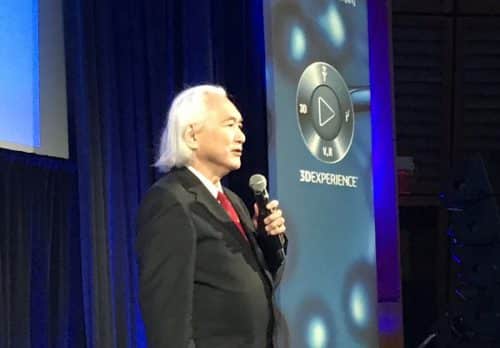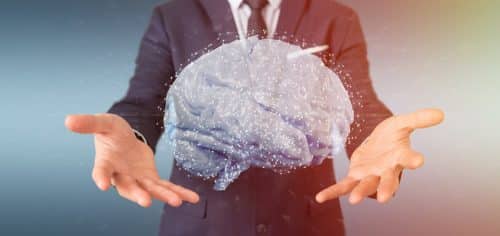Prof. Micho Kaku, physicist and author, predicts the next waves of technology, which will accelerate when Moore's Law collapses - in the near future artificial intelligence and nanotechnology will change our lives, and in the more distant future - a brain internet

Micho Kaku, professor of theoretical physics at the City College of the City University of New York, one of the drafters of string field theory and the author of bestsellers in the field of popular science, in which he makes science accessible to the public, was one of the main speakers at the conference Science in the age of experience, organized by Dassault Systèmes in Boston. In his lectures, Kaku talked about the next waves of technology, and how our lives will change in the future due to artificial intelligence and nanotechnology.
"Wealth does not come from one person selling to another, or for the government to take taxes and print money," Kaku said in his lecture, "all of these are zero sum games, the wealth is created due to the progress of science and technology. But science and technology don't happen all at once, they come in waves.
"The first wave was 200 years ago, when physicists were researching the laws of thermodynamics - the theory of heat. We can calculate according to Newton's laws how much energy is required to drive a locomotive and operate a steam engine. This set in motion the industrial revolution. Suddenly people had indescribable wealth thanks to the establishment of production lines. Eighty years later, scientists discovered the laws of electricity and magnetism, and these inventions ushered us into the age of electricity.
"Eighty years later, we physicists were working on quantum theory. This discovery gave us the transistors, the laser and all the wonders you see around you, at home, on the cell phone and more.
"If steam caused the first wave, electricity the second wave, and quantum theory led to the third wave of technology, what will be the fourth and fifth waves, which will turn society upside down? I say, that the fourth wave will be physics at the molecular level. The factors we identify with this wave are artificial intelligence - down to the level of neurons, nanotechnology and biotechnology. The fifth wave that will materialize between the middle and the end of the 21st century will be when we discover the laws of physics at the atomic level - fusion drive, quantum computers and brain networks."
One day, soon enough, Moore's Law will break down
"We know Moore's Law, according to which computing power doubles every 18 months. This is the reason for today's computing revolution, but Moore's Law is starting to slow it down. One day, soon enough, it will collapse. Silicon Valley will turn into the Rust Belt faster than you think. The wealth of many countries will be disrupted when Moore's Law collapses. It may take five, ten or 15 years, but then we will have to move to new generations of computing – atomic computers, DNA computers, optical computing, quantum computers – but we are not ready for either of those options right now.
"In the next step we will reach the atomic level of the brain itself. The future of the internet is the brain network, Brain net. Instead of sending digital signals, we will send feelings, sensations, memories. The first memory was sent online already two years ago. We can also photograph dreams. The brain network will cause a revolution in all fields. Who would want to watch TV? Television and cinema have not changed significantly (despite technological improvements) for decades. It's still about watching movies and listening to the soundtrack on the speakers. Think about it, young people - instead of sending an emoji of a smiling face, they will send feelings and memories from their brain at the end of each sentence."
What will drive the information age?

"Let's go back to the fourth wave, what will happen in the next twenty years? First, oil along with other fossil fuels fueled the industrial revolution. What will drive the information age? Well, the answer is data. Data will replace oil as the currency of the future. But crude oil needs to be processed and turned into petroleum products through the refineries. Same with the data. The data needs to be unified, it needs to be analyzed and then it needs to be visualized. Almost everything we do in our daily lives, almost every industry and every other area of our lives will eventually be computerized, digitized and visually processed through virtual reality and other technologies.
"Now we face several challenges - the first, can we symbolize life itself? Already today in operating rooms surgeons can get the internet into their glasses and download MRI scans. Medical schools are digitizing the human body today so that there is no need to dissect corpses. In fact, already today we use robots to perform the surgery (as an example the Israeli da Vinci robot was presented. A.B.). Before long, robots will perform all the surgery. We will create a visualization of the patient's body and plan the surgery, press a button and the surgery will be performed by the robot.
"The power of artificial intelligence will change the face of medicine, because artificial intelligence is good at recognizing patterns. Already today, if we make a competition between doctors who decipher x-rays, CT or MRI and robots, the robot will win in every test. A robot will be able to detect cancer, will be able to detect Alzheimer's in the first stages, and in general will be able to know the human body better than the person himself. Does this mean we will replace human doctors? No. In the end it is the person who will have to make the final decision. Only man can make life and death decisions. But the burden of deciphering countless MRI scans, the burden of searching for suitable chemicals for new drugs and the burden of analyzing the raw data will be done by robots.
"Virtual reality will also be integrated into every human activity. Scientists will be able to walk through a DNA molecule. An architect will be able to view what he designed and walk inside the building. We will use virtual reality to illustrate complex phenomena. And if you don't like virtual reality glasses, we will put virtual reality into contact lenses. This is the future of the internet in the coming years... blink and you'll be online. These contact lenses will also recognize human faces: if you look at someone you will see their biography next to their body. If they speak to you in Chinese, the computer will immediately translate into English. You will understand who you are talking to. Let's say you are at a cocktail party and there are important clients there, but you don't know who they are - in the future we will be able to know exactly who you should stick to at a cocktail party.
"Living in the future is like living on board Star Trek - go into a room, move your hands and transport yourself to space, the moon, Mars, or just a resort on Earth. You can adapt reality to your needs."
More of the topic in Hayadan:

5 תגובות
It seems that with all these advanced systems the human itself is in need of development and adaptation, otherwise it will be quite negligible or unnecessary, and will be lost. But for some reason this is not part of the vision of smart people like Chico Kaku and others like him, who are captives of the technological maxim that has many tools. It's a shame, because "the main thing is missing from the book".
There is still time until the end of Moore's Law and there are road maps until the end of the decade that reach 1 nm. As soon as we go below a single nanometer we will already be on the scale of single atoms and this will probably happen in the next decade and then there is already a physical limit that will cause Moore's Law to collapse. On the other hand, it is almost certain that in the next decade quantum computing will mature and will already be commercial, and then the focus of the chip companies will be miniaturization of the quantum chips and increasing the number of qubits in them, so to say that Silicon Valley will become the rust belt is disconnected from reality because companies that have an infrastructure of research, development and production of chips have The highest potential to lead the quantum computing market if they invest in the field as a future growth engine for the next decade.
Amir, Bibi foresaw what was to come and foresaw it in his first book.
How good we are to have such a leader.
(By the way, Putin too - good. He also thinks that artificial intelligence and a quantum computer are the new king's clothes.
What two great leaders.
We need to learn from people like them... they will also meet soon in Israel...
Who knows, maybe Putin in his kindness will decide to bring the drug addict back from prison,
Together with him, to her mother.
May they and people like them continue to serve us faithfully. And we, the normative people, will continue to support them). Aman Selah will praise the builder of a world for glory
It seems better to live in a cave
I already predicted it before him 🙂